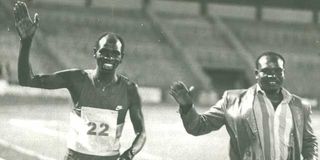Peers remember Rono as affable, gifted team mate

Henry Rono (right) celebrates with Mike Boit after Boit finished fourth in a 1,500 metres race at the Nyayo National Stadium in 1985. It was Boit’s farewell race. Rono died last Thursday in Nairobi.
What you need to know:
- Rono passed on five days after death had also robbed the country of its marathon world record holder, Kelvin Kiptum, in night road accident on February 11 along Eldoret-Eldama Ravine Road.
- Rono will be laid to rest on February 28 at his Kirobon farm, Kuresoi North, Molo, Nakuru County while Kiptum will be interred on Friday in Chepsamo, Elgeyo Marakwet County.
Peers and former team mates of the late Henry Rono have described the legendary runner as an affable man who was good company during their tours with Team Kenya for championships abroad.
Olympian race walker Elisha Kasuku, hurdlers Ruth Waithera and Rose Tata-Muya who travelled together with Rono as part of Team Kenya to championships abroad, remembered the athlete, who died on Thursday at Nairobi West Hospital while undergoing treatment, as a generous man who was supportive to team mates, social, friendly, and one who believed in his ability.
Olympian race walker-turned golfer Kasuku remembers how he and Rono used public transport from their respective homes in Nakuru to attend Team Kenya training camp in Kiganjo, Nyeri as they prepared for three major championships; the 1976 Olympic Games in Montreal, Canada, the 1976 All Africa Games (renamed African Games) in Algiers, and the 1978 Commonwealth Games in Edmonton, Canada.
“We all lived in Nakuru and we would wait for each other before boarding the Rift Valley Peugeot cars, popularly known as RVP,” the 71-year-old Kasuku said. “They dropped us at Nyama Kima area on River Road in Nairobi, from where we would take Nyeri Express buses for an hour’s trip to Nyeri.”
Kasuku remembers that before heading to Nyeri for Team Kenya camp, Rono would suggest that they feast on fried chicken at Nyama Kima.
“Rono knew whether or not we still had time to grab a meal and walk around before we could take the Nyeri Express buses (nicknamed ‘Nyeri to Hell or Heaven’ for the way they dashed to Nyeri in an hour). Rono really loved the thrill of speed,” Kasuku remembers.
Disappointed and dejected
“Although Kenya was among the African countries that boycotted the 1976 Olympics in protest against New Zealand rugby team’s tour of apartheid-era South Africa, Rono was at hand to encourage some of us, who were disappointed and dejected, having posted good qualifying times,” explained Kasuku.
Kasuku went on to claim bronze in 20km race walk at the 1978 Africa Games in Algiers, where Rono won two gold medals in championship record times; men’s 10,000m in 27 minutes and 58.90 seconds, and men’s 3,000m steeplechase in 8:15.82.
Waithera took bronze in women’s 200m at the Algiers Games. “Rono never used to complain much, even when we lacked our preferred food at the Algiers Africa Games and we were fed on canned beef,” Kasuku, who is disappointed that Rono is yet to be accorded the recognition he deserves, remembers.
“There is no other athlete in the world who has broken four world records in different races in 81 days. A stadium in Nandi County should have been named after him in his honour,” Kasuku said, adding that unlike other athletes, Rono never used pacesetters in his races.
Kasuku said that successive regimes should have fulfilled the late President Jomo Kenyatta’s promise to reward Kenyan medallists from the 1978 Commonwealth Games.
“Kenyatta had promised the medallits bulls, land and houses at Onyonka Estate in Nairobi two days before he passed on in 1978,” Kasuku said, explaining that Rono loved to socialise but drank alcohol moderately before moving to the USA.
Tata-Muya, who toured with Rono for the first time at the 1974 Christchurch Commonwealth Games in New Zealand, described him as a phenomenal runner with extra abilities.
“I remember he disappeared when the rest of the team was going to dine during the 1978 Commonwealth Games to go drinking but still managed to claim the second gold medals at the games,” said Tata-Muya, 63.
“Rono respected every athlete and never quarreled with anyone,” explained Tata-Muya.
Rono claimed the 3,000m steeplechase gold on August 7 before completing a double on August 10 with victory in 10,000m at the 1978 Commonwealth Games.
Waithera, who served with Rono at the Kenya Defence Forces as soldiers, said Rono was never envious of anyone and was generous to everyone.
“He could dish out dollars to us and tell us to buy something for our people back home,” said Waithera, 65. “Rono really worked hard, celebrated his victories well and loved to socialise,” said Waithera.
Rono, who had just turned 72 on February 12, passed away on Thursday morning while receiving treatment at Nairobi West Hospital where he had been admitted for 10 days.
Rono won the 1978 Edmonton Commonwealth Games 5,000m and 3,000m steeplechase titles as well as 3,000m steeplechase and 10,000m gold medals at the 1978 African Games.
In a span of only 81 days, Rono broke four world records in 10,000m (27:22.5), the 5,000m (13:08.4), 3, 000m (8:05.4), and the 3,000m (7:32.1).
Rono passed on five days after death had also robbed the country of its marathon world record holder, Kelvin Kiptum, in night road accident on February 11 along Eldoret-Eldama Ravine Road.
Rono will be laid to rest on February 28 at his Kirobon farm, Kuresoi North, Molo, Nakuru County while Kiptum will be interred on Friday in Chepsamo, Elgeyo Marakwet County.





